|
|
|
Sort Order |
|
|
|
Items / Page
|
|
|
|
|
|
|
| Srl | Item |
| 1 |
ID:
079251
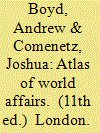

|
|
|
|
|
| Edition |
11th ed.
|
| Publication |
London, Routledge, 2007.
|
| Description |
viii, 254p.Hbk
|
| Standard Number |
9780415391689
|
|
|
|
|
|
|
|
|
|
|
|
Copies: C:1/I:0,R:0,Q:0
Circulation
| Accession# | Call# | Current Location | Status | Policy | Location |
| 052726 | 911/BOY 052726 | Main | On Shelf | General | |
|
|
|
|
| 2 |
ID:
188302


|
|
|
|
|
| Summary/Abstract |
Following the 2014 Ukraine crisis, Belarus and Kazakhstan appear caught in an alliance security dilemma characterised by intra-alliance threat and entrapment, as both are potential targets of militarised hybrid warfare by their vastly more powerful ally, Russia. Despite having sought foreign policy flexibility between the two increasingly opposed geopolitical camps of the West and Russia, Minsk and Nur-Sultan appear drawn further towards Moscow. Utilising their pre- and post-2014 national security documents, reinforced by an examination of their rhetoric and policies, this essay demonstrates how both countries reassessed their security environment in the wake of the annexation of Crimea and the initial war in the Donbas region.
|
|
|
|
|
|
|
|
|
|
|
|
|
|
|
|
| 3 |
ID:
147680
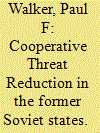

|
|
|
|
|
| Summary/Abstract |
The US Cooperative Threat Reduction (CTR) program, founded in the early 1990s to secure Soviet weapons of mass destruction (WMD)—nuclear, chemical, and biological—and promote WMD nonproliferation, has enjoyed great success. CTR has spent over $10 billion in the last twenty-five years to help eliminate thousands of nuclear warheads, dozens of nuclear submarines, 35,000 metric tons of chemical agent, and thousands of strategic missiles, bombers, and missile silos in former Soviet states. But it has also been beset with numerous funding, political, bureaucratic, technical, and planning challenges. The author reviews the history of CTR funding and legislation, discusses obstacles to implementation, and identifies five broad lessons from the program's early experiences that are applicable to future global security projects.
|
|
|
|
|
|
|
|
|
|
|
|
|
|
|
|
| 4 |
ID:
112796
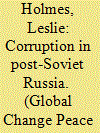

|
|
|
|
|
| Publication |
2012.
|
| Summary/Abstract |
Corruption has been a serious problem in post-Soviet Russia - though there was also much more of it in Soviet Russia than is generally realised. This article considers the scale of the problem, its causes and what both the authorities and civil society are doing about it. It argues that President Medvedev has been genuine in wanting to reduce corruption, and much more committed to this than either of his predecessors were. But corruption is so widespread and pervasive in Russia that it will take many years to bring it down to 'reasonable' levels; Medvedev's political will is a necessary but insufficient condition, and he requires greater political capacity and support. Moreover, since Putin has been elected to become president again (March 2012), the anti-corruption momentum built up by Medvedev will dissipate, unless Medvedev is made prime minister and given both full support and free rein by the president to pursue his anti-corruption drive.
|
|
|
|
|
|
|
|
|
|
|
|
|
|
|
|
| 5 |
ID:
147673


|
|
|
|
|
| Summary/Abstract |
This special issue of the Nonproliferation Review results from a project funded by the US Defense Threat Reduction Agency, aiming to identify lessons learned from efforts to eliminate weapons of mass destruction (WMD) around the world. It contains edited versions of papers presented at a November 2015 workshop at the Washington, DC, offices of the James Martin Center for Nonproliferation Studies. One section covers cross-cutting themes, including the strategic, diplomatic, legal, technical, and inter- and intra-agency dimensions of elimination. The second section discusses lessons learned from work in the former Soviet states, Iraq in the 1990s, Iraq in 2003–04, South Africa, Libya, and Syria. Major observations include that the field lacks institutionalization. There are few standing bodies with funding and responsibility for WMD elimination; each case usually emerges by surprise and has ad hoc character. Different combinations of states and international agencies may be involved, bringing varied authorities and competencies to different operational environments. A generic “checklist” approach accordingly may be best suited to applying past lessons to new missions.
|
|
|
|
|
|
|
|
|
|
|
|
|
|
|
|
| 6 |
ID:
090843
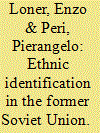

|
|
|
|
|
| Publication |
2009.
|
| Summary/Abstract |
The article seeks to 'measure' the concept of 'identification as titular' in regard to the members of five ethnic groups in the former Soviet Union (Bashkirs, Karels, Komis, Tatars and Yakuts) and the factors which strengthen, or conversely weaken, such identification. In order to do this it uses multigroup confirmatory factor analysis and multigroup structural equation modelling. Identification is mainly associated with a sense of national superiority and duration of residence in the home republic. The pattern among Yakuts, however, differs from that of the other ethnic groups and would require further detailed analysis.
|
|
|
|
|
|
|
|
|
|
|
|
|
|
|
|
| 7 |
ID:
140291
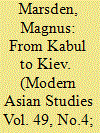

|
|
|
|
|
| Summary/Abstract |
While the territory of Afghanistan is widely connected in the popular and historical imagination to long-distance trade, Afghan society continues to be popularly represented as being made-up of ‘tribes’, who subscribe to static ‘honour codes’, and tenaciously cling to archaic tribal values. This article examines the significance of traders of Afghan background to commodity flows across a wide range of contexts in the former Soviet Union, especially in Russia and Ukraine and the Muslim-majority Central Asian Republics. It charts the social and political backgrounds of the merchants who make up this trading network, the nature of their connections to one another and the forms of mobility that make these connections possible, their complex relations with the communities amongst whom they live, and the types of moral value they attach to their work as traders.
|
|
|
|
|
|
|
|
|
|
|
|
|
|
|
|
| 8 |
ID:
107056


|
|
|
|
|
| Publication |
2011.
|
| Summary/Abstract |
This article compares the rates of intercountry adoption from 26 sending countries of the former Soviet Union and East Central Europe to 25 receiving countries during the period 2000-2006. While our data confirm that countries adopting foreign children have significantly higher incomes than those from which they adopt, they show no significant discrepancy in birth rates between the two groups, with some sending countries actually having lower birth rates than their corresponding receiving countries. We then suggest that high sending rates result, not from a large 'surplus' of children, but from institutions that can connect the sending countries' 'surplus' children with prospective parents in receiving countries, and that the legacies of communist rule include such institutions.
|
|
|
|
|
|
|
|
|
|
|
|
|
|
|
|
| 9 |
ID:
080806
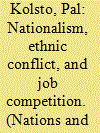

|
|
|
|
|
| Publication |
2008.
|
| Summary/Abstract |
The article examines the effects of job competition on ethnic relations within a multinational state. It argues that demographic increase leads to competition for blue-collar jobs while an increase in the number of graduates from higher education leads to competition over elite jobs. In the first case, people risk unemployment, in the second, blocked career opportunities. Mass-level unemployment may lead to anger-driven mass riots, while an intelligentsia will formulate more rational strategies to eliminate threatening competitors from the labour market. One such strategy is to insist that the state ought to be a national state, in which the national elites will be in control. While questions of identity no doubt also may have an enormously mobilising power in times of national resurgence, identity issues are normally intimately intertwined with interest politics. These mechanisms are traced in the history of ethnic mobilisation in the Soviet Union and the post-Soviet states during and after perestroika
|
|
|
|
|
|
|
|
|
|
|
|
|
|
|
|
| 10 |
ID:
096497
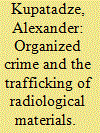

|
|
|
|
|
| Publication |
2010.
|
| Summary/Abstract |
Based on unique empirical data, including interviews with smugglers of radiological materials and the investigators who track them, this article discusses nuclear smuggling trends in the former Soviet republic of Georgia. Smuggling in Georgia mainly involves opportunist smugglers and amateurs, as opposed to professional criminals and terrorists; however, this does not mean that radiological smuggling is devoid of professionalism or organization. The article demonstrates that professional criminals are rarely involved in smuggling due to the unreliable nature of the market for radiological materials and the threat radiological smuggling could pose to professional criminals' ability to wield political power and operate legal commercial enterprises.
|
|
|
|
|
|
|
|
|
|
|
|
|
|
|
|
| 11 |
ID:
137283
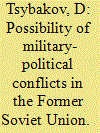

|
|
|
|
|
| Summary/Abstract |
THE FORMER SOVIET UNION (FSU) remains a zone fraught with conflicts on the political map of the world. Political instability and festering disputes, including territorial disputes and disputes between political elites, prevail in many countries of the region.
|
|
|
|
|
|
|
|
|
|
|
|
|
|
|
|
| 12 |
ID:
107050
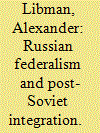

|
|
|
|
|
| Publication |
2011.
|
| Summary/Abstract |
The article compares the development of two institutional systems organising intergovernmental relations in the former Soviet Union: Russian federalism and post-Soviet regional integration. Despite the common origins of these two sets of institutions, and the common developmental trends they experienced over the first decade of their existence, the two systems diverged significantly in the 2000s. The article discusses the driving forces behind these differences. It also addresses various forms of direct links between centralisation in Russia and regional integration in the post-Soviet space; these include cross-border cooperation, policy spillovers and perceptions of decentralisation by national elites.
|
|
|
|
|
|
|
|
|
|
|
|
|
|
|
|
| 13 |
ID:
119695
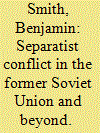

|
|
|
|
|
| Publication |
2013.
|
| Summary/Abstract |
Recent research on separatist nationalism has focused on the most common location of new states in the international system-the postcommunist world. While providing the largest number of cases for exploration, the arguably unique features of the Soviet system may have effects that do not easily translate to other parts of the world. This article reviews a recent set of books that highlights this question, focusing on the legacies of Soviet ethnofederalism in catalyzing secession, separatist war, and nation-state crisis. These books share in common a tendency to deemphasize the historical lineages of separatist nationalism and to focus more proximately on institutions. The article builds on the discussion of recent research by engaging two separate cross-national data sets to explore the role of ethnofederal institutions and of historical legacies. It concludes by arguing for a return to historically situated studies of center-minority conflicts and for greater engagement across regional lines of expertise.
|
|
|
|
|
|
|
|
|
|
|
|
|
|
|
|
| 14 |
ID:
147675
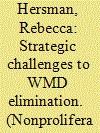

|
|
|
|
|
| Summary/Abstract |
Operations to eliminate weapons of mass destruction (WMD) are highly situation-dependent and defy easily replicable solutions and approaches. Nevertheless, by examining WMD elimination missions as they have transpired over the past several decades, we can begin to identify several consistent challenges. Learning to better prepare for these challenges—both within and across various facets of the US government as well as with our international partners—will enhance future elimination operations and their chances of success. The article concludes by asserting that military and nonmilitary approaches to these operations are not competing ideological approaches but rather reflect the complexity of the operational environment and the subsequent need for a range of legal, political, military, financial, and diplomatic tools.
|
|
|
|
|
|
|
|
|
|
|
|
|
|
|
|
| 15 |
ID:
082092
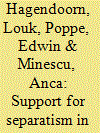

|
|
|
|
|
| Publication |
2008.
|
| Summary/Abstract |
This study examines popular support for separatism among Russians and non-Russian titular nationalities (titulars) in 10 ethnic republics of the Russian Federation: Karelia, Komi, Tatarstan, Bashkortostan, Udmurtia, Adygea, Dagestan, Kabardino-Balkaria, Sakha-Yakutia and Tuva. A survey was carried out in the urban regions of these republics in 1999 and 2000 in which 5,233 Russians and 4,703 titulars participated. We found that perceived negative inter-group relations significantly contribute to support for separatism among titulars, but reduce support for separatism by Russians. In contrast, indicators of prosperity of the republic and prior separatist elite-activism predict support for separatism among both titulars and Russians.
* An earlier version of this paper was presented at the 2006 Scientific Meeting of the International Society for Political Psychology, Barcelona, 15 July 2006. The research was funded by the Dutch Organization of Scientific Research under the label 'Russians as minorities, post-communist ethnic relations in five semi-autonomous regions of the Russian Federation I and II' in 1997 and 1998. The Centre for Sociological Studies (OPINIO) of Moscow State University gathered the data. The authors would like to acknowledge the International Association for the Promotion of Co-operation with Scientists from the New Independent States of the Former Soviet Union (INTAS) for grant 03-51-4997
|
|
|
|
|
|
|
|
|
|
|
|
|
|
|
|
| 16 |
ID:
117529
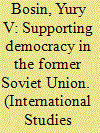

|
|
|
|
|
| Publication |
2012.
|
| Summary/Abstract |
Recent studies find that US democracy assistance has helped build new democratic regimes across the globe. Nearly two decades of democracy assistance in the former Soviet Union (FSU), however, appear to have had a negligible impact on democracy in the region. This research uses a time-series cross-sectional statistical analysis to establish that US democracy assistance efforts in the FSU have failed to enhance democracy in the region. The incentives that FSU leaders had to misrepresent their commitment to democracy and the United States' understandable misperception of these leaders' actions help to explain this failure.
|
|
|
|
|
|
|
|
|
|
|
|
|
|
|
|
| 17 |
ID:
122830


|
|
|
|
|
| Publication |
2013.
|
| Summary/Abstract |
Previous research has reported substantial levels of nostalgia for the Soviet era among citizens of some of the independent republics that emerged from its collapse. We report new analyses from eight former Soviet republics, and from two surveys, in 2001 and 2010, comparing attitudes to government in the Soviet period and at the time of the surveys, as well as expectations for the future. Everywhere, views of the past have become less positive and those of the present more positive. However, both the views in each survey and the change between each of them vary among countries and socio-demographic groups.
|
|
|
|
|
|
|
|
|
|
|
|
|
|
|
|
| 18 |
ID:
077343
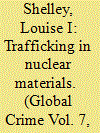

|
|
|
|
|
| Publication |
2006.
|
| Summary/Abstract |
The essay examines the networks that facilitate the transport of nuclear materials from the source to their possible purchasers. Analyzing the role of prisons in criminal operations, the interaction of criminals and terrorists, and the character of new organized crime groups, the author concludes that some of the most serious nuclear smuggling is not random or opportunistic. Rather, the most serious trafficking is rarely detected because it is run by professionals whose well established smuggling networks, facilitated by corruption, have the capacity to move significant quantities of diverse contraband without apprehension. Technical solutions to address this problem are not sufficient because detectors cannot identify well guarded HEU. Rather, much more attention needs to be paid to the crime and terror networks that can facilitate this trade
|
|
|
|
|
|
|
|
|
|
|
|
|
|
|
|
| 19 |
ID:
144285
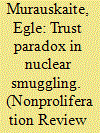

|
|
|
|
|
| Summary/Abstract |
This article explores the paradox of trust in the largest nuclear smuggling operation involving highly enriched uranium (HEU) discussed in open source literature. In the first effort to understand the type, extent, and role of trust in nuclear smuggling enterprises, it draws from literature on trust development in legitimate businesses as well as criminal enterprises. Observed behavioral patterns in this case challenge traditional notions of the internal dynamics of temporary groups engaged in nuclear smuggling and operational realities of such activities. The article seeks to explain why individuals agree (and continue) to operate in this high-risk environment, unbound by close personal ties, without any effort to verify the background, motives, or qualifications of the fellow conspirators. It offers ways to advance current nonproliferation efforts in non-state actor interdiction by exploiting the environment of shallow trust in temporary groups.
|
|
|
|
|
|
|
|
|
|
|
|
|
|
|
|
| 20 |
ID:
147674
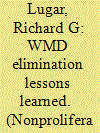

|
|
|
|
|
| Summary/Abstract |
Former Senator Richard Lugar (Republican of Indiana) provided the keynote address at the workshop held in the Washington, DC, office of the James Martin Center for Nonproliferation Studies that formed the basis of this special issue of the Nonproliferation Review. In these remarks, he discussed the importance of the Cooperative Threat Reduction programs created on 1991 legislation, co-sponsored, with Senator Sam Nunn (Democrat of Georgia). Sen. Lugar called for the maintenance and continued expansion of these programs as well as for the “creative and relentless” pursuit of new opportunities to meet evolving threats from weapons of mass destruction.
|
|
|
|
|
|
|
|
|
|
|
|
|
|
|
|
|
|
|
|
|